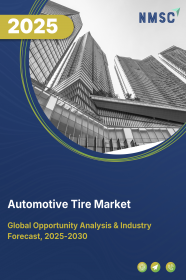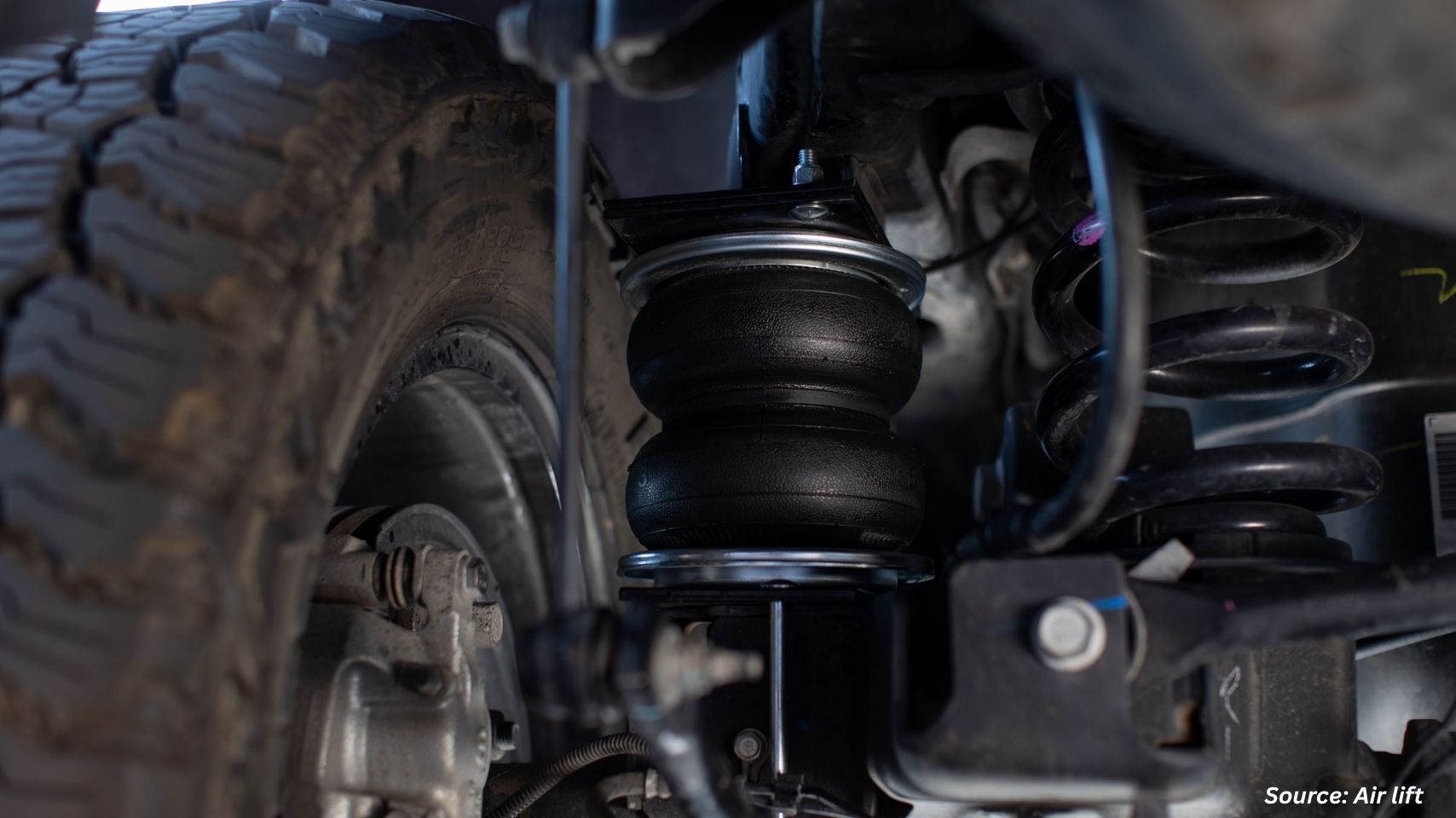
Automotive Tire Market by Tire Type (Snow Tires, Sport Tires, Urban Tires, and All Terrain Tires), by Design (Radical, and Bias), by Rim Size (13 inches to 15 inches, 16 inches to 18 inches, 19 inches to 21 inches, and Greater than 21 inches), by Season (Winter, Summer, and All Season), by Application (On the Road, and Off the Road), by Vehicle Type (Passenger Car, Commercial Vehicle, and Electric Vehicle) and Others– Global Opportunity Analysis and Industry Forecast 2025-2030
Automotive Tire Market Overview
The global Automotive Tire Market size was valued at USD 134.22 billion in 2024 and is predicted to reach USD 199.3 billion by 2030 with a CAGR of 6.8% from 2025-2030. An automotive tire, commonly known as a car tire, is a specialized rubber component used in vehicles, particularly automobiles, to provide traction, support, and stability on the road. It is a cylindrical structure made of layers of rubber and other materials, such as fabric and steel. Automotive tires bear the weight of the vehicle, absorb shocks, and transmit driving and braking forces.
They play a crucial role in ensuring grip and manoeuvrability, contributing to the overall performance and safety of the vehicle. The tire's main purpose is to create a contact point between the vehicle and the road surface, enabling safe and efficient transportation. Automotive tires come in various sizes, tread patterns, load capacities, and speed ratings, allowing consumers to select the appropriate tire based on their specific needs and the requirements of their vehicles.
Market Dynamics and Trends
The robust growth of the automotive industry across the globe is leading to an increase in vehicle production, which is driving the demand for the automotive tire market. As per the latest report published by the European Automobile Manufacturers Association, global motor vehicle production reached 85.4 million in 2022, an increase of 5.7% from 2021. This rise in global vehicle production plays a pivotal role in driving the growth of the market, as the escalating demand for tires is driving the demand for the automotive sector.
Moreover, the increasing demand for safer and more secure vehicles is boosting the demand for high-quality tires further accelerating the growth of the market. These tires are designed to address various safety concerns, including grip, stability, and performance in adverse weather conditions. This heightened emphasis on safety features is playing a significant role in accelerating the growth of the tire market, as consumers increasingly prioritize vehicles equipped with tires that enhance overall safety performance.
Furthermore, advancements in tire technology, including innovations aimed at improving vehicle performance, enhancing safety features, and increasing fuel efficiency, are driving the automotive tire market growth. For instance, in December 2022, Continental launched two technologically advanced tires tailored for automotives.
The new tire models are designed to meet the specific needs of drivers, focusing on enhanced performance, safety, and durability. With a commitment to innovation, Continental aims to provide Middle Eastern car enthusiasts with cutting-edge tire solutions that address various driving conditions. This launch underscores Continental's dedication to meeting the evolving demands of the automotive market in the Middle East, offering drivers access to state-of-the-art tire technology.
However, the increasing raw material price of tires along with their susceptibility to punctures and damages are restraining the growth of the market. On the contrary, the introduction of self-sealing and run-flat tires that offer benefits such as enhanced safety, convenience, and reduced downtime in case of tire damage or punctures is anticipated to generate significant opportunities for the growth of the automotive tire market.
Market Segmentations and Scope of the Study
The automotive tire market report is segmented on the basis of rim size, design, tyre type, season, propulsion type, vehicle type, and region. On the basis of rim size, the market is divided into 13 inches to 15 inches, 16 inches to 18 inches, 19 inches to 21 inches, and greater than 21 inches. On the basis of design, the market is classified into radial and bias. On the basis of tyre type, the market is segmented into tubeless and tube. On the basis of season, the market is divided into winter, summer and all-season. On the basis of propulsion type, the market is segmented into internal combustion engine and electric vehicle. On the basis of vehicle type, the market is divided into passenger cars, light commercial vehicle, and heavy commercial vehicle. Regional breakdown and analysis of each of the aforesaid segments include regions comprising of North America, Europe, Asia-Pacific, and Rest of the world.
Geographical Analysis
Asia-Pacific dominates the automotive tire market share and is expected to continue its dominance during the forecast period. This is attributed to factors such as the increasing demand for automotives, both passenger and commercial vehicles, in countries such as China, Japan, and South Korea is driving the market growth. According to the China Association of Automobile Manufacturers, China witnessed a significant increase in vehicle sales, with a total of 27 million vehicles sold in 2022, compared to 23 million car sales in 2021, contributing to the increasing need for automotive tires in the market.
Moreover, increasing government support driven by increasing investment by both local and foreign market players for the development of automotive industry in Asia-Pacific is further driving the growth of the automotive tire market trends in this region. According to the latest report published by the Ministry of Commerce and Industry of India, in December 2022, Mahindra & Mahindra announced to invest USD 1.2 billion for EV manufacturing plant in India. With the growing automotive industry in this region, the demand for automotive tires is poised to rise, boosting the growth of the market.
On the other hand, North America is expected to show a steady growth in the automotive market due to the presence of one of the largest automotives industry in this region. According to the International Trade Administration, the U.S. ranks as the second-largest automotive industry globally, selling 14.5 million vehicles in 2020, driving the demand for automotive tires in this region. Presence of key market players such as The Goodyear Tire & Rubber Company and Cooper Tire & Rubber Company is further accelerating the growth of the automotive tire market in this region.
For instance, in June 2023, Goodyear launched its groundbreaking real-time tire intelligence capabilities, enabling teams to monitor tire performance and make data-driven decisions in real-time for enhanced performance and safety. This innovative technology aims to revolutionize the way teams manage tire usage and optimize performance during endurance racing events.
Competitive Landscape
Various market players operating in the automotive tire industry include Michelin North America, Inc, Bridgestone Americas Tire Operations, LLC, The Goodyear Tire And Rubber Company, CEAT Limited, Continental Tire The Americas, LLC, Pirelli And C. S.p.A., Hankook Tire And Technology, Sumitomo Rubber, Industries, Ltd, Yokohama Tire Corporation, Toyo Tire U.S.A. Corp., Giti Tire, MRF Tyres, Apollo Tyres, Maxxis Tires, Zhongce Rubber Group Co. Ltd., among others. These market players are adopting various strategies such as product launches to remain dominant in the global market.
For instance, in June 2023, Yokohama Off-Highway Tires introduced a new agriculture tire specifically designed for farmers, aiming to enhance their productivity and efficiency in the fields. The tire, equipped with advanced technology and optimized tread design, promises improved traction, durability, and fuel efficiency to meet the demanding requirements of agricultural operations.
Moreover, in April 2023, Hankook Tire unveiled a new ultra-high-performance all-season tire tailored for SUVs, catering to the growing demand for versatile and high-performing tires. The newly launched tire combines exceptional grip, handling, and durability, providing a reliable and enjoyable driving experience in various weather conditions.
Furthermore, in March 2023, Continental Tires India is set to introduce intelligent tires, incorporating cutting-edge technology to enhance safety and performance on the road. The intelligent tires feature advanced sensors and connectivity, providing real-time data on tire conditions and enabling drivers to make informed decisions for a safer and more efficient driving experience.
Key Benefits
-
The report provides quantitative analysis and estimations of the automotive tire market from 2024 to 2030, which assists in identifying the prevailing market opportunities.
-
The study comprises a deep-dive analysis of the automotive tire market including the current and future trends to depict prevalent investment pockets in the market.
-
Information related to key drivers, restraints, and opportunities and their impact on the market is provided in the report.
-
A competitive analysis of the players, along with their market share is provided in the report.
-
SWOT analysis and Porter Five Forces model are elaborated in the study
-
Value chain analysis in the market study provides a clear picture of the roles of stakeholders.
Automotive Tire Market Key Segments
By Tire Type
-
Snow Tires
-
Sport Tires
-
Urban Tires
-
All Terrain Tires
By Design
-
Radical
-
Bias
By Rim Size
-
13 inches to 15 inches
-
16 inches to 18 inches
-
19 inches to 21 inches
-
Greater than 21 inches
By Season
-
Winter
-
Summer
-
All Season
By Application
-
On the Road
-
Off the Road
By Vehicle Type
-
Passenger Car
-
Commercial Vehicle
-
Light Commercial Vehicle
-
Heavy Commercial Vehicle
-
-
Electric Vehicle
By End User
-
OEM
-
Aftermarket
By Region
-
North America
-
The U.S.
-
Canada
-
Mexico
-
-
Europe
-
The UK
-
Germany
-
France
-
Italy
-
Spain
-
Denmark
-
Netherlands
-
Finland
-
Sweden
-
Norway
-
Russia
-
Rest of Europe
-
-
Asia Pacific
-
China
-
Japan
-
India
-
South Korea
-
Australia
-
Indonesia
-
Singapore
-
Taiwan
-
Thailand
-
Rest of Asia Pacific
-
-
RoW
-
Latin America
-
Middle East
-
Africa
-
Key Players
-
Michelin North America, Inc
-
Bridgestone Americas Tire Operations, LLC
-
The Goodyear Tire And Rubber Company
-
CEAT Limited
-
Continental Tire The Americas, LLC
-
Pirelli And C. S.p.A.
-
Hankook Tire And Technology
-
Sumitomo Rubber Industries, Ltd
-
Yokohama Tire Corporation
-
Toyo Tire U.S.A. Corp.
-
Giti Tire
-
MRF Tyres
-
Apollo Tyres
-
Maxxis Tires
-
Zhongce Rubber Group Co. Ltd.
REPORT SCOPE AND SEGMENTATION:
|
Parameters |
Details |
|
Market Size in 2024 |
USD 134.22 Billion |
|
Revenue Forecast in 2030 |
USD 199.3 Billion |
|
Growth Rate |
CAGR of 6.8% from 2025 to 2030 |
|
Analysis Period |
2024–2030 |
|
Base Year Considered |
2024 |
|
Forecast Period |
2025–2030 |
|
Market Size Estimation |
Billion (USD) |
|
Growth Factors |
Growing automotive industry across the globe drives the market Rising demand for safe and secure automotive tires boosts the market growth Advancement in tire technology is driving the growth of the market |
|
Countries Covered |
28 |
|
Companies Profiled |
10 |
|
Market Share |
Available for 10 companies |
|
Customization Scope |
Free customization (equivalent up to 80 working hours of analysts) after purchase. Addition or alteration to country, regional, and segment scope. |
|
Pricing and Purchase Options |
Avail customized purchase options to meet your exact research needs. |

















 Speak to Our Analyst
Speak to Our Analyst





















